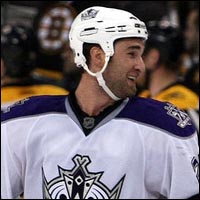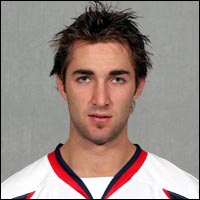by Adam Kimelman || NHL.com
 Moving from Detroit to Los Angeles may have dropped Kyle Quincey in the standings, but sent him sky-high in his career.
Moving from Detroit to Los Angeles may have dropped Kyle Quincey in the standings, but sent him sky-high in his career.
Quincey had been stuck in the American Hockey League for most of his three seasons with the Red Wings organization, frequently making the commute from Grand Rapids to Detroit.
The Red Wings never soured on Quincey, but with proven veterans Nicklas Lidstrom, Brian Rafalski, Niklas Kronwall, Brad Stuart, Chris Chelios and Andreas Lilja ahead of him, there was little opportunity in the NHL.
The Wings never lost faith, however, and showed just what they thought of Quincey over the summer when they signed him to a two-year, one-way contract.
"You’re not going to give a one-way contract to an American League player," Red Wings general manager Ken Holland told NHL.com. "We liked him, thought he was a good player."
Things didn’t go so well at training camp, though, and the Wings found themselves in a tough spot.
"We came to camp with nine NHL defensemen and we were prepared to keep eight," said Holland. The ninth guy happened to be Quincey. Holland wanted to keep the 6-foot-2, 207-pounder, but that would have required him passing through waivers. He investigated a trade, but that was a non-starter. So the Wings reluctantly put Quincey on waivers with the hope he could slip through and be assigned to Grand Rapids.
That didn’t happen, as the Kings claimed him and penciled him into their starting lineup.
"How everything unraveled, I couldn’t be happier," Quincey told NHL.com. "I was buying in and wanted to be part of the championship teams, but when it comes to getting a chance, it just wasn’t coming. Everything happens for a reason and I’m very thankful for being here. It’s been great."
The Kings feel the same way, as Quincey has gone from a fringe NHL player in Detroit to a 21-minute-per-night, all-situation player in Los Angeles. In 69 games, Quincey leads the team’s defensemen with 34 assists and 38 points, and he’s second on the club in ice time at 21:07 per game.
"He’s stepped right in," Kings coach Terry Murray told NHL.com. "He’s had a huge impact on our team. With his overall play, meaning power play, penalty kill, his composure, especially his ability on the power play. He has a shot from the blue line that seems to find a way to the net almost all the time, and that’s a special skill. That’s a big boost to the special teams. And coming in as a veteran player to play in all situations, play a lot of minutes and really do the right things all the time."
Coming into the season, Quincey had just 13 games of NHL experience, plus 13 games in the 2007 playoffs. Playing big minutes in the big leagues for the first time, though, hasn’t troubled Quincey.
"I really just reverted back to junior and the American League days where I was the guy who played that many minutes and was on the ice all the time," Quincey said. "I didn’t stop and look around. This is how it is. It was a lot harder playing those games where I played seven or eight minutes in Detroit, where if I make a mistake I’ll get sent down. Here, the coach has a lot more patience and the team depends on you playing well. You have to produce."
 He’s produced not just on the ice, but off it as well. While Quincey is just 23, he serves as a leader for a young Kings team, especially a blue line that includes youngsters Drew Doughty, Jack Johnson and Matt Greene.
He’s produced not just on the ice, but off it as well. While Quincey is just 23, he serves as a leader for a young Kings team, especially a blue line that includes youngsters Drew Doughty, Jack Johnson and Matt Greene.
"I think Quincey’s impact is pretty profound in the fact that he’s coming in with doing the right stuff and playing the game on the checking side of the puck," said Murray. "… Anytime you have a player that does that consistently, the young guys are taking notes and doing the same things. You get rewarded with your play with minutes played because of what you’re doing out there. The young guys see him playing 20 minutes a night and they’re watching him because he’s getting the ice time.
"He’s a character guy. Comes to the building every day and he’s out there trying to get better with his game. He’s not a real vocal guy, but his solid play is the way he shows leadership to the young players."
With Quincey, the Kings have lowered their goals-against average from 3.21 (28th in the League) last season to 2.73 (10th) this season, and their shots allowed from 32 per game (28th) to a League-best 27.
"The game plans have structure to it and there’s a reason behind it," said Quincey. "There’s a very few simple points. We’re a young team, but he drives it home and it’s paying off now. I owe a lot to him. He never gets rattled. He’s very calming. If we’re down a goal or up a few goals, he’s calming force behind the bench and we read off him."
Murray believes that even though Quincey never got significant ice time in Detroit, growing up in the Detroit system made an indelible impression.
"I think that’s a big part of why he was able to come to us and be a player that was going to play a lot of minutes and have an impact on our defensive core," Murray said. "Playing with a winning organization and coming through the system, it has an effect on a player. … You learn to the play the game at the right pace to keep it fundamentally sound."
Quincey’s success doesn’t shock Holland.
"What he’s doing doesn’t really surprise me," he said. "We felt Kyle could be a top-four defenseman and play around 20 minutes (per game). Given the veterans we have, in order to sometimes play those minutes you need opportunities and the opportunity wasn’t here."
He’s certainly made the most of his opportunities in Los Angeles.

































